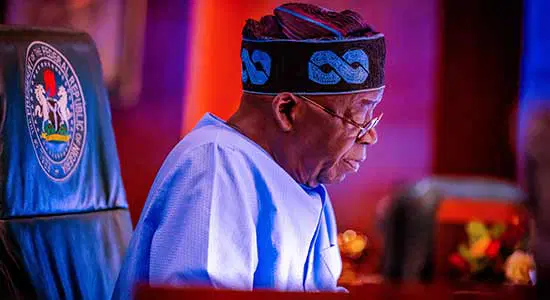There are strong indications that President Bola Tinubu is considering a significant reshuffle of his cabinet, potentially removing ministers who have been deemed underperforming. The President has been under growing pressure from both within his party, the All Progressives Congress (APC), and external sources to take decisive action.
Last year, Tinubu established the Result and Delivery Unit, led by Mrs. Hadiza Bala-Usman, the Special Adviser on Policy Coordination, to monitor the performance of ministers and other top government officials. The President made it clear that any minister or aide failing to meet expectations would be dismissed.
This past week, Tinubu replaced the directors-general of the National Intelligence Agency and the Department of State Services after their respective resignations. Sources within the Presidency, who spoke on the condition of anonymity, revealed that a cabinet reshuffle is imminent. Some ministers are likely to be dismissed, while others may be reassigned to different ministries to enhance effectiveness. However, the specific ministers who might be affected were not disclosed.
One source stated, “What I can tell you is some (ministers) will go. A few will swap positions, then new people will be brought on board. The President will focus more on capacity now—on people who can easily add value to his government.”
Another insider noted that there is a consensus among Tinubu’s close associates that the cabinet needs strengthening to effectively implement his policies. “The general concern among some of his aides, friends, and even the public is that the cabinet can be far better than this. It is one thing to announce policies and another for your ministers to deliver the outcomes you want,” the source added.
Recent criticism, including a harsh editorial by the Financial Times, pointed out that while Tinubu has made bold policy decisions, his cabinet lacks the strength to deliver on those reforms. This has led to growing concerns that the government is not performing as expected. The next year is seen as critical, with many believing it will define Tinubu’s administration.
Opposition Parties’ Response
Opposition parties, however, have expressed skepticism about the potential reshuffle. Yunusa Tanko, the campaign spokesman for former Labour Party presidential candidate Peter Obi, emphasized that their focus is on electoral reforms rather than cabinet changes. “Sacking or replacing your cabinet with new people is an extension of state capture. He will only be replacing them with his loyalists, which we know will be a strategy ahead of 2027,” Tanko remarked.
Ibrahim Abdullahi, Deputy National Publicity Secretary of the People’s Democratic Party (PDP), attributed the poor performance of the ministers to what he called Tinubu’s lack of empathy for Nigerians. He questioned the legitimacy of Tinubu’s presidency and expressed doubt that a cabinet reshuffle would bring about meaningful change.
Peter Ameh, National Secretary of the Coalition of United Political Parties (CUPP), warned Tinubu against making the same mistake as his predecessor, Muhammadu Buhari, by retaining underperforming ministers for an extended period. Ameh argued that a responsible government would have dismissed these ministers long ago.
Calls for a Leaner, More Effective Government
Debo Adeniran, Executive Director of the Centre for Anti-Corruption and Open Leadership, asserted that fewer than 15 ministers have met the expectations of Nigerians. He urged Tinubu to “weed out” underperforming ministers and consider merging ministries to reduce the size and cost of government. Adeniran described some of Tinubu’s appointments as “jobs for the boys” and emphasized the need for a more focused and effective cabinet.
Abiodun Bamgboye, Secretary of the Joint Action Front, attributed the poor performance of the ministers to the administration’s “anti-people” policies. He argued that the economic policies of Tinubu’s government have hindered ministers from meeting the expectations of Nigerians.
Economic expert Aliyu Ilias suggested that holding ministers accountable by reducing their numbers could improve governance. “Sacking underperforming ministers will help this government, and this will be like a check and balance on them to perform well,” Ilias said.
As the pressure mounts, all eyes are on President Tinubu as he contemplates the next steps to strengthen his administration and deliver on his promises to the Nigerian people.
























